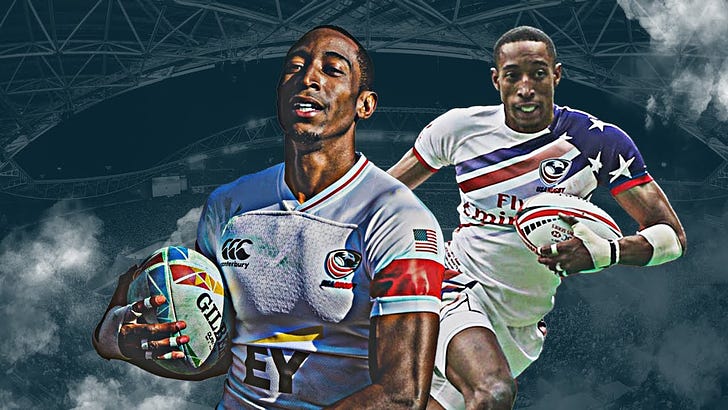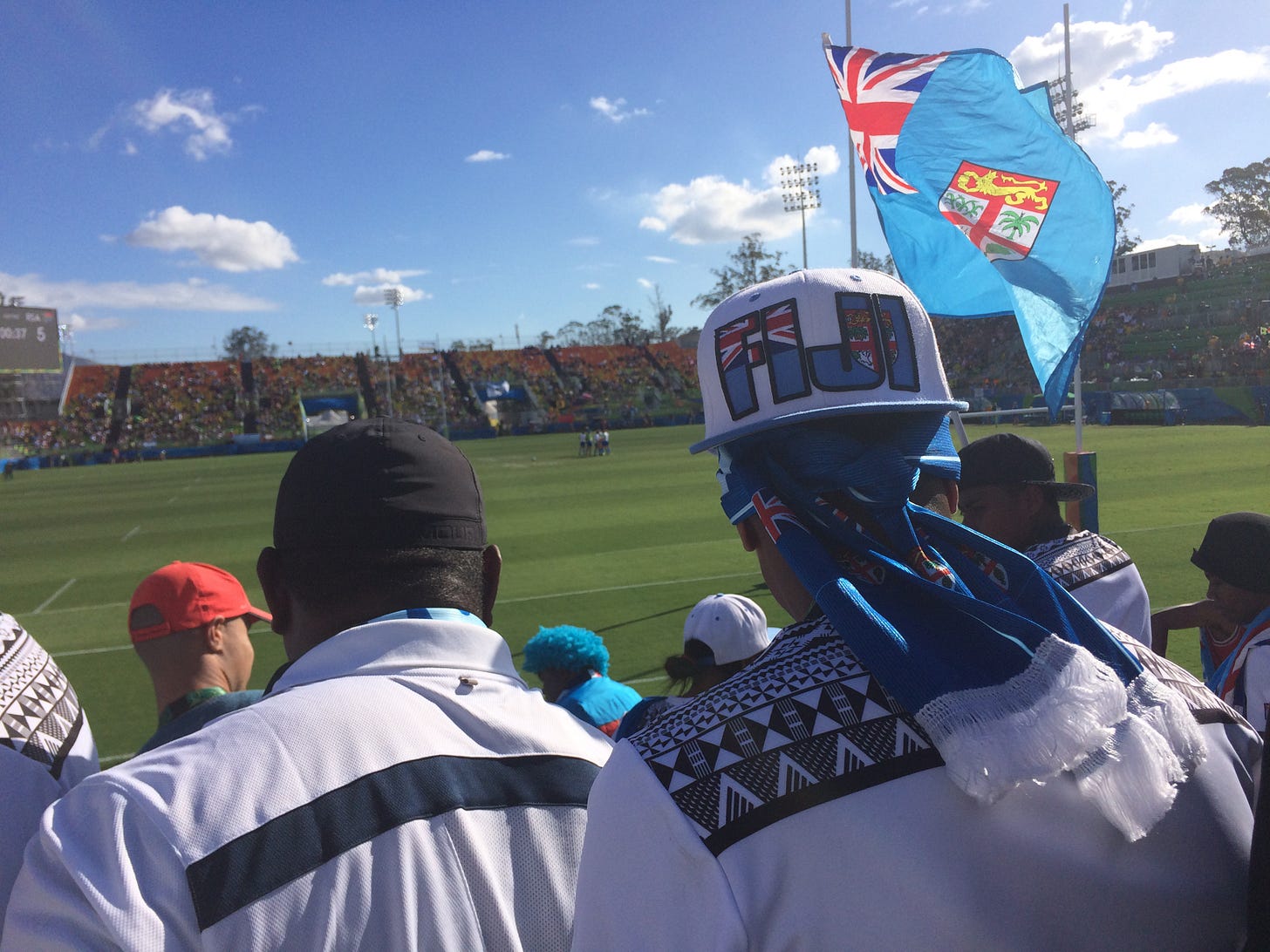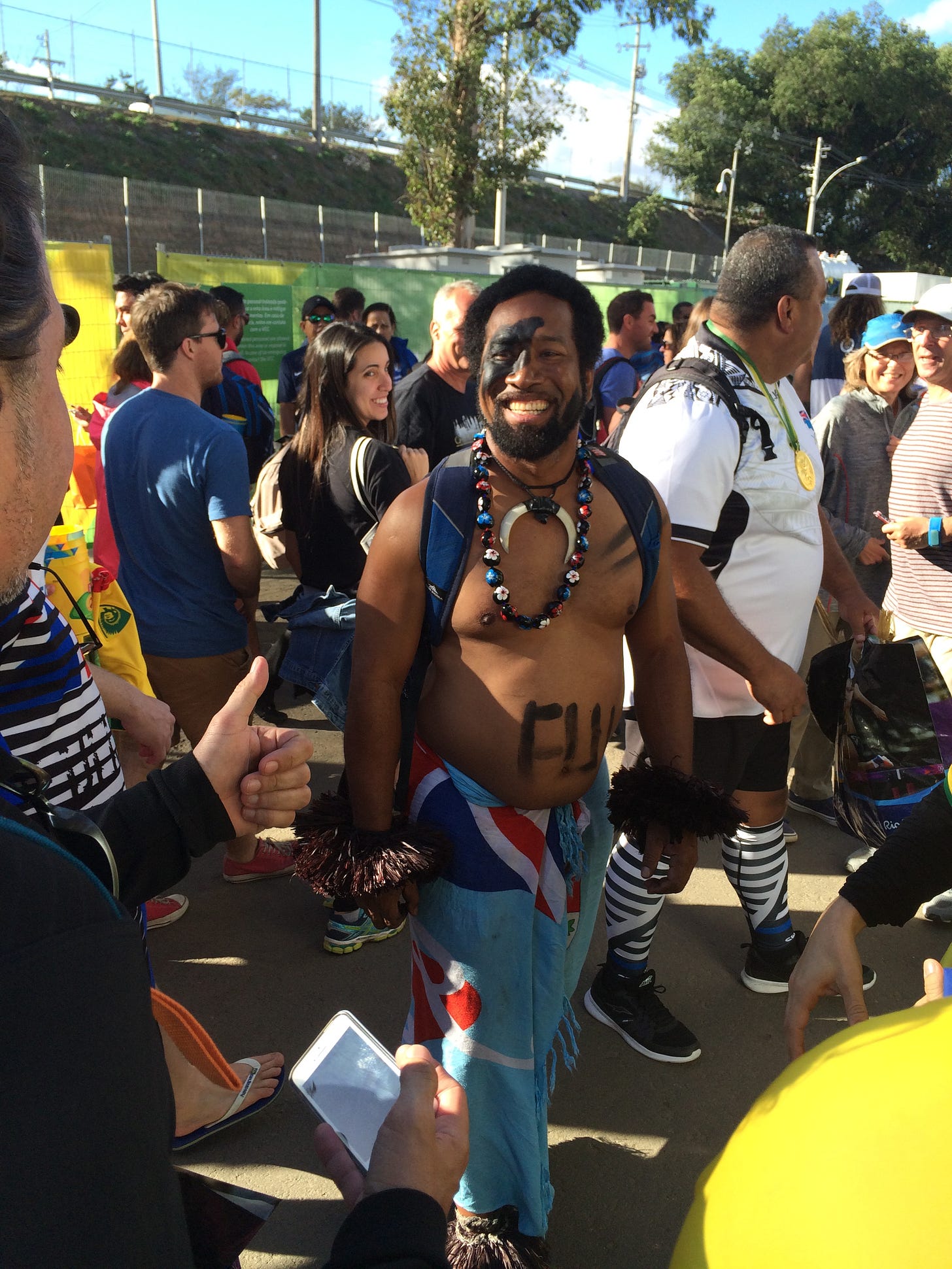An American's Guide to Olympic Rugby
Ever wanted to watch rugby? They put a faster, easier-to-understand version in the Olympics—and it doesn't hurt that Team USA is better at this version than the standard one.
This is part 9 of RINGS RODGE, an 15-part series where Olympics obsessive and journalist Rodger Sherman breaks down a different sport every day heading up to the 2024 Paris Olympics. You can probably get serious previews of the most popular sports on other sites… here, we’re doing unserious previews of sports that aren’t regularly on TV in between the four years between Olympics. Rodger didn’t really time things right so he’s not going to be able to get to all the sports BUT HE’S GOING TO TRY HIS BEST TO DO AS MANY AS POSSIBLE.
Today: Rugby Sevens!
Why should I watch Olympic rugby?
When you watch a rugby match, you immediately think, oh yeah, that’s what sports are supposed to look like. It’s violent yet clean, burly yet nimble. It’s like football without the helmets, the pads, and rules like “illegal formation” and “ineligible man downfield.” But it’s hard to figure out what’s going on and what everybody’s trying to do
Great news: They put an easy-to-understand, higher-scoring, quicker version of rugby into the Olympics for people like us.
A standard rugby union game features 15 players per team and takes 80 minutes. The Olympic tournament is rugby sevens, which generally uses the same rules as rugby union, but there are only seven players per team and only 14 minutes per game. It’s a little bit easier for Americans to pick up, both as fans and players—throw a converted wide receiver out on the wing and they might become a star. Here’s Perry Baker, a former Division II wide receiver at Fairmont State who transitioned to rugby and has twice been named World Rugby Sevens Player of the Year:
Yeah! That’s a real thing! There are dudes from Florida scoring Rugby Touchdowns! (They’re called “tries,” but as with Cricket Dingers, I reserve the right to call them Rugby Touchdowns.)
It’s rugby hors d’oeuvres served with a gold medal. Maybe we should come back for the main course!
Why don’t they just play regular rugby in the Olympics?
You can’t play a full tournament for a violent 80-minute game over the span of the two-week Olympics. And you couldn’t just shorten a full rugby game to 14 minutes—with 30 guys on the pitch, scoring is pretty hard, and it sometimes takes 20 or 30 minutes for anybody to score. But with only seven players per team, there’s a lot of open space and a lot of tries.
Rugby sevens wasn’t founded for the Olympics—they’ve been playing it in Scotland since the 1800s, international tournaments started in the 1970s, and they’ve been playing the World Sevens Series since 1999. (The Sevens Series is a world tour featuring national teams which serves as the top level of rugby sevens. It was rebranded as SVNS in 2023, but quite frankly, I’m not gonna type that.)
This fits a larger trend across the Olympic Games. The IOC wants to squeeze smaller versions of the world’s most popular sports into the Olympics’ two-week, one-location format. At the 2028 games, they’ll add 7-a-side flag football, T20 cricket, and lacrosse sixes. These smaller sports keep the Olympic footprint down, and give the games a ratings boost—people are more likely to tune into watch games they’ve actually heard of than judo and archery.
Who’s good at rugby sevens?
Broadly, the same teams who are good at standard rugby. The winningest teams at the men’s Rugby World Cup are South Africa and New Zealand, which are the the winningest and second-winningest teams in the Sevens series. New Zealand’s women’s rugby team has won six of nine Rugby World Cups, and their women’s sevens team has won seven of 11 Sevens Series.
But it’s a little bit easier to field a competitive team in a sport with 7 players per team than 15. The shining example here: the Flying Fijians, who won back-to-back gold medals in 2016 and 2020. They’re the national pride of Fiji—they even have the team on money. When I went to the rugby tournament in Rio, the Fijians were there—even though it was presumably pretty hard to get from the South Pacific to Rio, and there weren’t a lot of Fijians athletes competing in other Olympic sports.
Fiji has a population of about a million—the population of South Dakota in the South Pacific. They’d never won an Olympic medal in anything before the addition of rugby sevens. And they don’t quite have the sheer numbers to be elite at 15-a-side rugby scene—they’ve never made it past the quarters at the men’s or women’s Rugby World Cup. Kids there don’t grow up of becoming big pro rugby stars in Australia or England—they want to play for the national sevens team. And they play like a team that’s been playing together their whole lives. They’re masters of the offload, dropping Jason Williams-esque no-look passes to streaking teammates while dodging tackles:
Samoa has also won the men’s Sevens Series, and countries like Kenya and Canada have won individual tournaments. Sadly, the Fijians have dropped off in recent years and aren’t likely to pull the three-peat in Paris, but I’m glad I got to rant about them anyway.
How is this like American football?
I love keeping track of the various codes of football around the globe. When you watch people in Ireland and Australia and Saskatchewan all kicking slightly different balls through slightly different shaped uprights for slightly different amounts of points, it feels like how Charles Darwin must have felt looking at all those finches.
A few obvious similarities between the sports:
in our football, you score a touchdown by carrying the ball into the opposing end zone; in rugby, you score a try by carrying the ball into the opposing end zone, at which point you must literally touch the ball to the ground for the score to count. Their touchdowns are really more touch-downs than our touchdowns.
After scoring you kick the ball through the uprights for extra points—in rugby, you get five points for the try and two for the conversion. The big difference is that in rugby, you attempt the conversion
You can also kick the ball through the uprights for three points during regular play, but in both sports, everybody has pretty much decided this is pointless because you get more points for touchdowns.
You can throw the ball backwards as much as you like! We don’t really do it in football anymore, unless you’re the Kansas City Chiefs.
When you get tackled to the ground, play restarts. In rugby, the situation is a bit more complicated than football—instead of just bringing up second down, the tackled player must pass the ball to a teammate or release the ball on the ground.
There are a bunch of moments which look vaguely like an offensive line and defensive line squaring off, including the scrum, which is where we get the word “scrimmage” from. Unlike American football, neither team has possession in these moments, and the two teams are literally pushing each other until they can gain possession of the loose ball in the middle.
Are we going to see the haka?
Probably. While New Zealand’s All Blacks and the Black Ferns, famously perform Māori hakas before most 15-a-side rugby matches, it wouldn’t really make sense to do them before every match at a sevens tournament, because there are so many games and the events are so tightly scheduled. Like, New Zealand’s men’s team is going to play Japan at 6 p.m. on the first day of pool play and then South Africa at 9:30—then they’ll play five more matches on the same field, and then New Zealand will come back out and play South Africa—not a lot of time to squeeze in a dance.
But traditionally, the teams perform a haka after winning a sevens tournament… and it seems pretty likely that New Zealand is going to win either men’s or women’s tournaments, if not both. Here are the Black Ferns after winning gold in Tokyo:
Are there any GOATs in Paris?
Let’s keep talking Kiwis! The woman leading the haka in that video up there is Portia Woodman-Wickliffe, who has racked up a truly massive amount of W’s. (Including one in her last name—she used to just be Portia Woodman before marrying her teammate, Renee Woodcliffe.) She’s the all-time leading try-scorer at the Olympics… and in the women’s sevens series… and in the 15-a-side Women’s Rugby World Cup. And she’d have higher numbers if she hadn’t devoted the early part of her career to professional netball.
Woodman-Wickliffe is a winger, which means she waits out wide to catch passes from her teammates and burst downfield for tries. The main attribute of wingers is breakaway speed, but if you watch this compilation of her top tries from both 7-a-side and 15-a-side, you’ll see that she’s also got some Beast Mode in her—RIP to the Team USA players trying to take her down in #2.
She was named Sevens Player of the Decade for the 2010s, and was also 15-a-side player of the year in 2015 and 2017. All in all, she has two Rugby World Cups and an Olympic gold in sevens, and is looking for a second gold to close out here career—she’s announced her retirement after Paris.
So is Team USA good?
Better than you’d think! First of all, our women’s team has won a 15-a-side Rugby World Cup—it was the inaugural edition back in 1991, but still—and made the semis in 2017. They were runners-up on the Sevens Series in 2019.
As with Fiji, Samoa, and others, America is better at rugby sevens than the fully-fledged version of the game. In 15-a-side rugby, Team USA is a dismal 3-26 all-time at the men’s Rugby World Cup. But in sevens, Team USA regularly performs well and produces legitimate stars. We may not have rugby infrastructure… but we have fast people. Baker, whose video I posted above, has the second-most tries in the history of the Sevens Series; another former Division II wide receiver, Carlin Isles, ranks eighth.
But both teams are in the midst of a downturn. On the men’s side, Isles is retired and Baker is 38. Team USA finished ninth on the 2023-24 Sevens Series—their worst result ever. They’ll need to keep it close against France and Fiji. And there’s a pretty clear gap between the top three teams in women’s sevens and Team USA in fourth—they’ll need to upset Australia, New Zealand, or France to medal.







My possibly incorrect impression of Team USA's men's rugby 7s team is that while the speedy sport-conversion guys (Baker and Isles) give us legit world class scoring threats, they aren't very much help on defense, and the rest of the team around them is somewhat pedestrian by world standards. Good enough to be competitive but a long shot for a medal